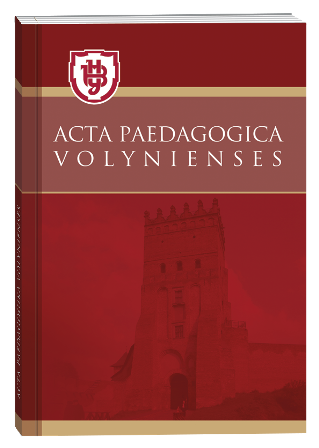FEATURES OF A STUDY OF LITERATURE ACTIVITY OF JUNIOR SCHOOL CHILDREN ARE IN THE PROCESS OF WORKING OF MYTHS ON THE LESSONS OF THE LITERARY READING
DOI:
https://doi.org/10.32782/apv/2023.4.4Keywords:
literary activity, junior schoolchild, literary reading lesson, genre, myth, work analysisAbstract
The article deals with topical issues of teaching literary reading, which are closely related to the methodology of processing literary works in the reading lesson, namely myths. Literary and methodical information for the teacher is presented, the knowledge of which will make it possible to influence the effectiveness of the literary reading lesson through the competently constructed literary activity of younger schoolchildren in the process of processing myths. The terminological essence of the myth genre and its genre specifics, program requirements, specific methodical techniques and practical forms of work in the literary reading lesson are clarified. It has been found that the literary work on the myth is aimed at developing the ability to independently define, to be aware of its genre features, to distinguish structural parts, to identify mysterious, enchanted, unusual places, objects, creatures, extraordinary power, amazing transformations of characters, to analyze their actions, motives. We have determined the content and features of literary work: -familiarization of students with myths that are not sufficiently presented in the reader, with the aim of developing interest and ability for independent reading activity; – mastering the techniques of their structural-semantic and figurative analysis; – development of figurative, critical, logical thinking and speech in the process of working with myths; – formation of skills of independent work with various types and sources of information, methods of working with periodical, reference literature for a deeper understanding of the content of myths; – development of imagination and the ability to express oneself in various types of literary and creative activity.
References
Галич О. А. Роди та жанри літератури: довідник для вчителів. Рівне, 1994. 62 с.
Літературознавчий словник-довідник. За ред. Р. Т. Гром’яка, Ю. І. Коваліва, В. І. Теремка. 2-е вид., виправл., доп. Серія: Nota bene. Київ: Академія, 2007. 752 ст.
Державний стандарт початкової загальної освіти [Електронний ресурс]. Режим доступу: http:www.mon.gov.ua/index.php/ua/.
Джежелей О. В. Літературна освіта молодших школярів. Початкова школа. 1994. № 1. С. 25–27.
Іванова Л. І. Визначення рівня літературної компетентності випускника початкової щколи. Теорія і практика навчання та виховання: Науковий часопис НПУ ім. М. Драгоманова, серія 17. Вип.3. К., 2007. С. 71–79.
Іванова Л. І. Жанрова характеристика літературного твору як засіб його кваліфікованого аналізу молодшими школярами (на прикладі вивчення міфів). Матеріали міжвишівських наукових читань: Українська література від давнини до сучасності: парадигми, напрямки, проблеми. Запоріжжя: Запорізький національний університет, 2016. С. 56–58.
Коваль Г. П., Іванова Л. І., Суржук Т. Б. Методика читання: навч. посібник. Тернопіль: Навчальна книга – Богдан, 2008. 280 с.
Кодак М. Жанр у часопросторових вимірах: до генології літературної класики. Слово і час. 2003. № 3. С. 3–7.
Літературна скарбничка: Довідник для учителя: Літературне читання. Жанри. За ред. Л. І. Іванової. Рівне: РДГУ, 2015. 135 с.
Типові освітні програми для закладів загальної середньої освіти. 1–2 та 3–4 класи. К.: Світич, 2019. 336 с.







